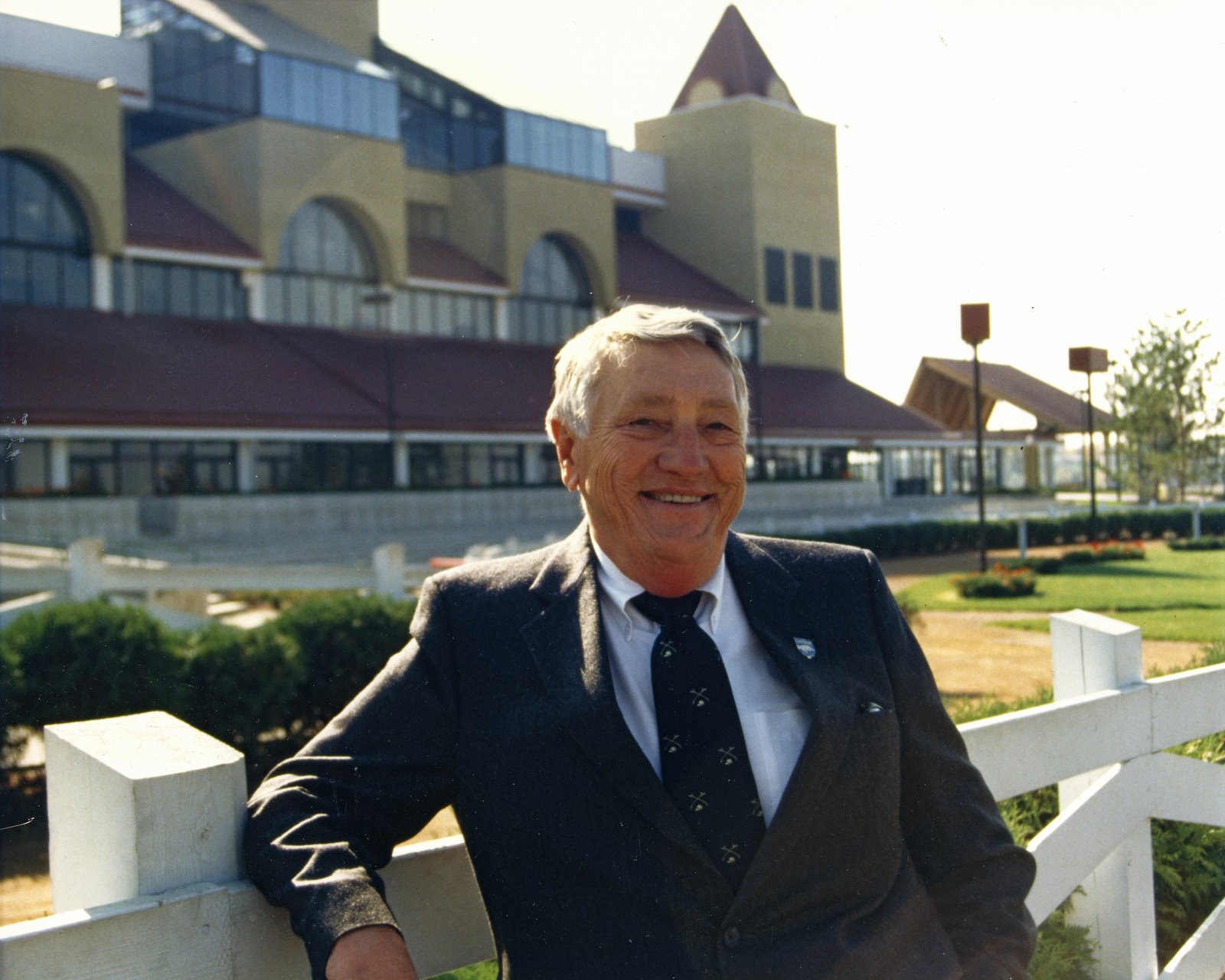The horses went about their business, some a little less less willingly in response to the sultry air that hung over Shakopee Wednesday morning. Stable hands plugged in fans throughout the barns to keep the air circulating. Here and there a groom hosed down a lathered horse that shook and whinnied with gratitude as the cool water splashed over its warm body and momentarily scattered the flies.
A fellow hosing down the legs on a horse in front of one of the outdoor stalls commented to his companions. “If he ever gets well, this son-of-a-gun can run.”
Down the line, trainer Bob Ryno hustled his horses off the mechanical walker back into their stalls ahead of the loud, angry refuse truck approaching the bin outside his barn.
Other horses worked over the track. Stable hands mucked stalls. Trainers lined up in the racing office to enter their horses in the races being drawn that morning. Scott Rhone shoed a horse in one of the barns. Jockey agents hustled business for their riders.
And none of it would have been possible without Brooks Fields, the founding father of Canterbury Park who died on Monday at age 89.
Many of those now present in the stables at Canterbury Park never knew Fields or heard of him only in passing. Others knew well the part he played in bringing pari-mutuel racing to Minnesota, this man with limited knowledge of the sport at the start but willing to take a gamble nonetheless.
“This was his vision,” said Bernell Rhone, a trainer at Canterbury since the doors opened in 1985.
Others less familiar with Fields’ contribution were grateful just the same.
Justin Evans has been in Shakopee a mere two years and knew Fields only as the man he had seen visiting the paddock in a wheelchair before the Brooks Fields Stakes.
“God bless him. We need more people like him in this sport,” Evans said.
Canterbury president Randy Sampson informed employees of Fields’ passing earlier in the week with an email.
In that message Sampson said: “I had a special bond with him due to the fact that he and I are the only two to have held the title of president in the history of Canterbury. I told him many times that I was honored to be in his company and hoped to be able to live up to the standards he had set.”
Tom Knust was the racing secretary when Canterbury Downs opened in 1985.
“Two things impressed me about him most,” Knust said. “The first were his convictions about doing things right. Even with the track in downward spiral, he wanted to make sure that he paid all of his debts, didn’t owe anyone money so that it wouldn’t affect his family.”
There were also those Brooks Fields aphorisms. “He was kind of like a Will Rogers,” Knust added. “He always had a quip. He was bright, intelligent and made people feel at ease when he talked to them. He could have gone into politics and been a big success. He was an extraordinary person. A good person.”
Nat Wess, Canterbury’s man in charge of the Claiming Crown, was assistant general manager under Fields.
“He was an interesting man,” Wess said. “He didn’t know horse racing, but he was a people person and knew how to make the best use of the people he had. He worked really well with (general manager) Stan Bowker, who put together the (executive) team here.”
Jockey agent Richard Grunder recalled approaching Fields after the Canterbury Hall of Fame breakfast last year.
Grunder has worked in one capacity or another, including race caller, in Shakopee since Canterbury opened.
He shook Fields’ hand and told him. “Because of you I was able to raise my son, pay my bills, pay my mortage.”
Fields attracted that kind of loyalty.
Jockey Paul Nolan has dominated the Brooks Fields Stakes, winning the race three consecutive times and four times overall. Fields presented Nolan with the trophy on a couple of occasions. “He seemed like a real gentleman. He made you feel special,” Nolan said.
Tom Metzen, president of the Minnesota HBPA, put it this way:
“I knew Brooks from day one and he was probably the most honorable person I’ve met in my life.”
Metzen said that all a person needs to know about Fields he could have read in the portion of his obituary designating contributions: the Fields’ Scholarship Fund for Minnesota Students at Gonzaga University, the Courage Center or charity of your choice.
Fields also started the Brooks Fields Quality of Life Foundation, which assisted racetrackers in need of help for chemical or substance abuse. Before Canterbury Downs, Fields was an executive vice president with Burdick Grain Co. for 29 years. He also founded Northwest Business Services and worked as a grain merchandiser for Pillsbury Mills. He was a graduate of Yale and served as a Chinese interpreter with the U.S. Army in China during WWII.
Canterbury was his “retirement” project and there are countless horsemen, fans and others grateful to him for that endeavor.
“This place is here because of him,” Grunder said. “We are so fortunate that he stepped to the plate and built this first-class facility.”
